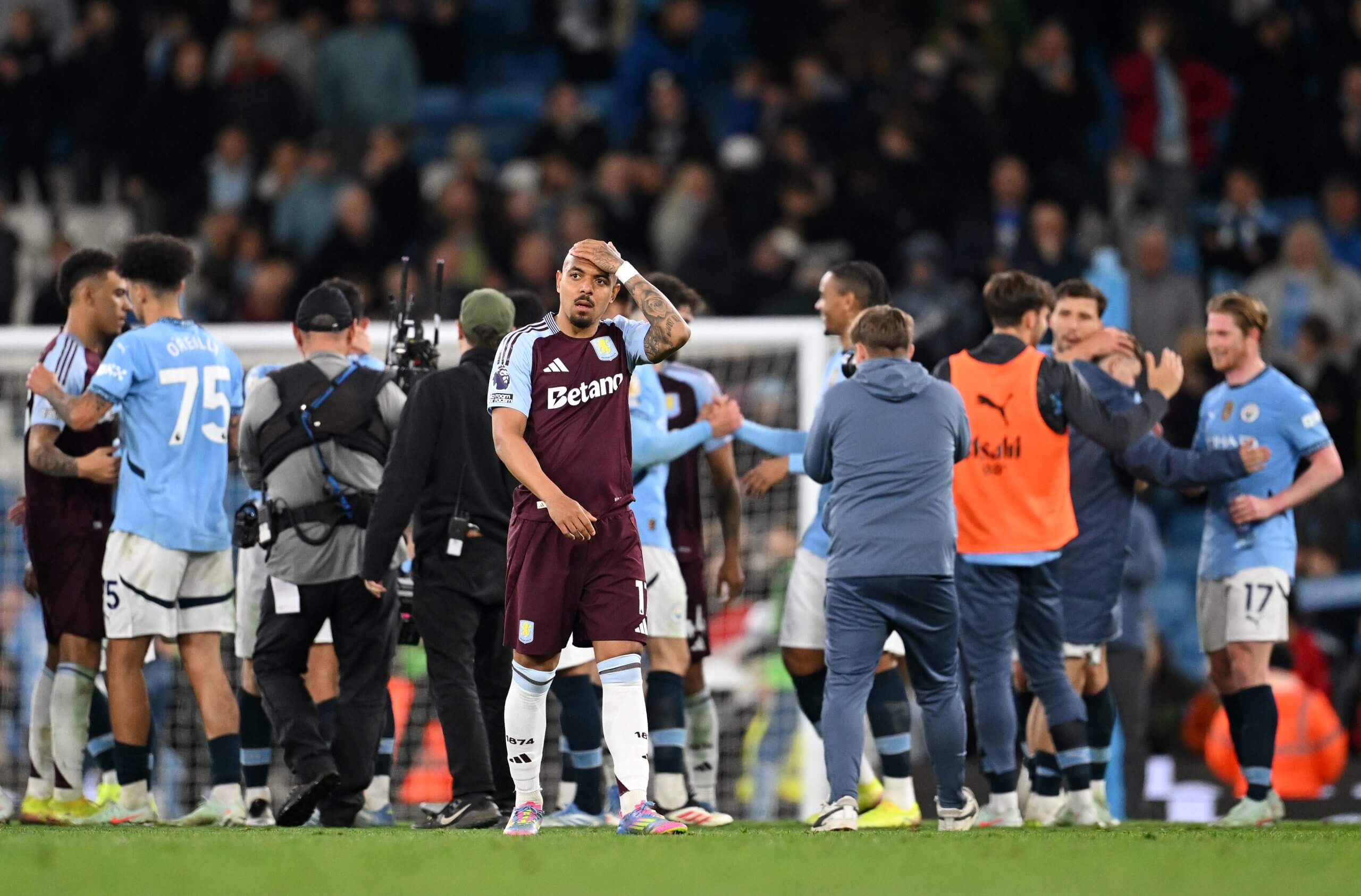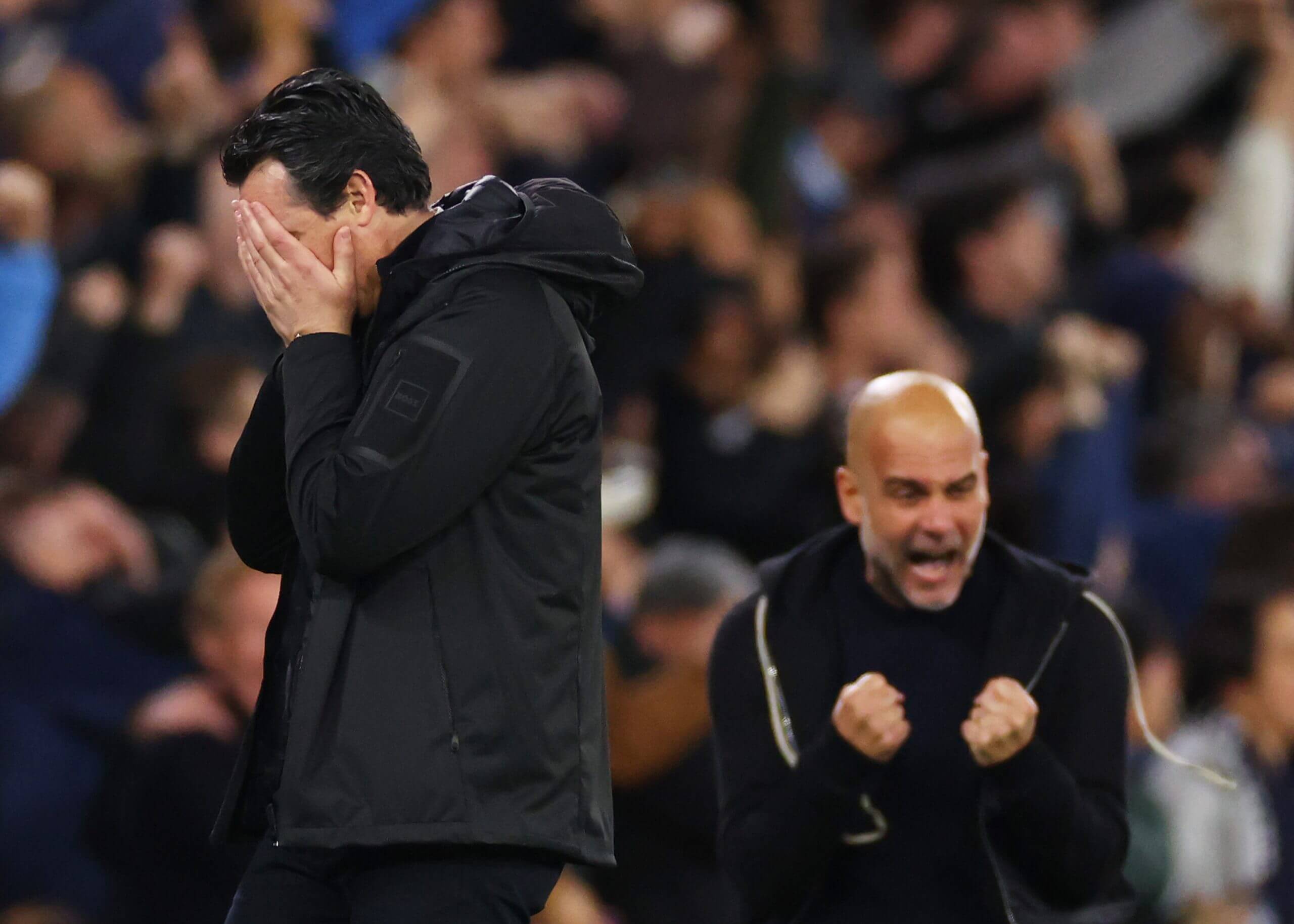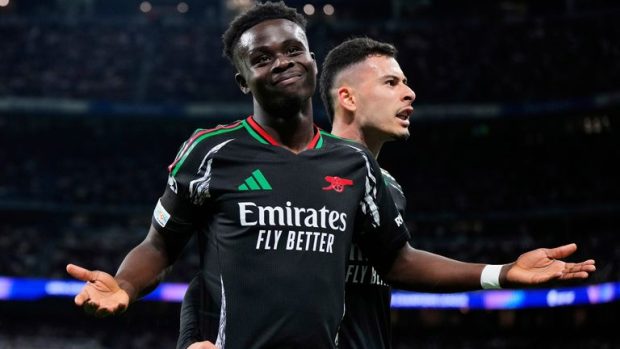
Unai Emery looked up at the heavens, then closed his eyes in abject frustration. It was the type of gut-punch reaction a 94th-minute winning goal against your team conjures.
Exasperation then, yes, but maybe not surprise. Because after all the highs of this compelling season for Aston Villa, there have been more than enough late stings to make the latest feel eerily familiar.
Advertisement
On the whole Villa are the real deal, but, as they found at the Etihad stadium on Tuesday, they are also not yet the complete finished article when it comes to being convincing Champions League qualification contenders. They have a penchant for conceding late goals that leaves them vulnerable on nights like this, and to set-backs that could well prove costly.
Only relegated Southampton (nine) have conceded more added-time Premier League goals this season than Villa. Matheus Nunes’ strike was the eighth occasion that Emery’s team have let one in at that do-or-die stage of a contest.

Villa’s players digest late defeat (Michael Regan/Getty Images)
They do not always punish you. Phil Foden’s 92nd-minute goal at Villa Park before Christmas in the corresponding fixture was, in the end, just a consolation as the hosts won by the same 2-1 scoreline by which they succumbed on Tuesday night.
But Villa have lost six of the other games when they conceded late, including one in similarly galling circumstances to this, at Nottingham Forest — another of their direct rivals for Champions League qualification — back in December. In the other fixture they dropped points when Bournemouth forced a late equaliser in October. It is a debilitating habit when you are chasing a top five finish with such minimal room for error.
They sit seventh, two points off the top five having played a game more than all but Manchester City. Accordingly, Opta now rate their chances of qualifying for the Champions League at 17.5 per cent.
Emery must balance Saturday’s FA Cup semi-final against Crystal Palace with their final four league games. Both the opportunity to consolidate a place at Europe’s top table and the chance to claim major domestic silverware for the first time since 1996 are attractive, so his juggling of resources must be flawless.
It is no easy task.
It was plain to see why he was reluctant to rest Morgan Rogers at the Etihad, even though the clash in Manchester was his 49th game of the season — significantly more minutes than he has ever played previously in his young career. That workload may be at the point of taking a toll.
Advertisement
That Rogers lacked his usual spark at times does not in itself make Emery’s team selection against City wrong. He also gave Amadou Onana a start after his goal from the bench against Newcastle, and was rewarded with a generally impressive performance from the Belgian barring a shaky start when he was caught in two minds positionally for City’s opener.

Rogers lacked his usual spark on his return to his former club (Carl Recine/Getty Images)
But it is not necessarily in central midfield where the biggest headaches await the Spaniard.
Emery is having to make difficult decisions across his attack. He restored Ollie Watkins to the bench at City despite his spectacular, angry rampage against Newcastle at the weekend. Then again the man he selected in his stead, Marcus Rashford, hit the post after 18 seconds, confidently scored Villa’s spot-kick equaliser, and was a constant threat.
If he deserves the benefit of the doubt for those calls, it is harder to look past the lack of pragmatism shown as he went for the throat late against City at a ground where history repeatedly smacks Villa in the face. They have now lost their last 15 league visits to the Etihad, extending their longest ever losing run away to a side in their league history.
Whatever he may think privately, perhaps as he delivered that dramatic glance into the night sky, in public at least the Villa manager was uncompromising. He was simply not having suggestions he should have held on for a point rather than throwing on more attacking players, like Donyell Malen in the 86th minute when he also had two defenders still on the bench.
“We wanted to win and always have to try and build our mentality in this direction,” he said. “It would have been a good point, yes, but not enough, Three points were the best option we could have and I was not happy with one point. It was a good point (in hindsight) after we lost.
“City are more of a favourite than us, but we were competing and trying to win.”

The contrasting emotions of Emery and Guardiola after Nunes’ late winner (Marc Atkins – AVFC/Aston Villa FC via Getty Images)
He was defiant, too, when it came to conceding such late goals, casting his mind back to that 92nd minute catastrophe at Parc des Princes when Nuno Mendes made it 3-1 to Paris Saint-Germain in the first leg of the Champions League quarter-final. “The level is high,” he said. “This happens. We were close to beating them, but they have huge quality in players and today the same when he (Guardiola) subs (Jeremy) Doku to come on and go man to man against tired players.
Advertisement
“Before that, Malen was getting in the box and I was believing we could win the match. I was pushing them to get more and they (City) did the same and scored when we didn’t.”
Few Villa supporters will be too angry at a man who has made them believe great things are possible. Emery’s mindset is that his team should come to the home of the reigning champions and win. There’s a lot to admire in that and, ultimately, it may be the ideology that drags the culture of the club into the elite for the long-term.
This season, though, the nagging suspicion remains that it may also be what stops them.
(Top photo: Carl Recine/Getty Images)
This news was originally published on this post .









Be the first to leave a comment